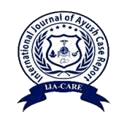A promising individualised Homoeopathy approach in the management of Poly- Cystic Ovarian Syndrome (PCOS) - A Case Report
Abstract
Polycystic Ovary Syndrome (PCOS) is a common hormonal disorder affecting women of reproductive age, characterized by irregular menstrual cycles, excess androgens, and ovarian cysts. Modern medicine treatments for PCOS primarily focus on symptom management using hormone therapies that have side effects. This case study explores the effectiveness of Homeopathy in the treatment of PCOS. In this case study, a 27-year-old female presenting with irregular menses associated with severe cramping pain in the lower abdomen with heavy bleeding. Menses 5 to 7 days / 35-40 days cycle. According to ultrasonography findings, bilateral polycystic ovarian morphology was present. Through an individualized approach, Sepia in LM potency from 0/1 to 0/14 over the span of 8 months was prescribed. After medication, significant improvements were observed in menstrual regularity, resolution of symptoms, and enhancement of emotional well-being over an eight-month period. This case underscores the potential of Homeopathy as a treatment modality for PCOS and suggests the need for further research in this area.

This work is licensed under a Creative Commons Attribution-NonCommercial-NoDerivatives 4.0 International License.

